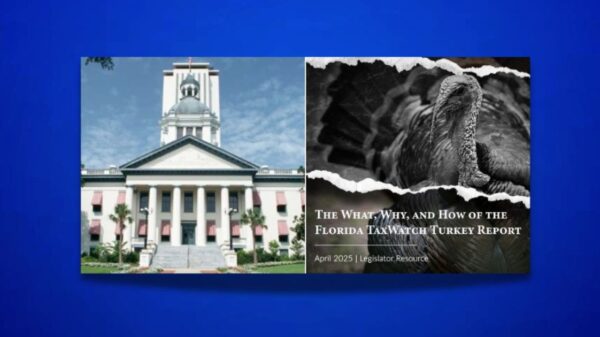Last week, Florida TaxWatch (FTW) released “A Rising Tide Sinks All Homes: The Effects of Climate Change on Florida’s Economy,” a comprehensive report developed to help taxpayers and policymakers better understand the potential costs and consequences of climate change on each of the 11 industries that comprise Florida’s economy.
In the report, FTW also offers strategic, multi-faceted recommendations to mitigate those impacts and ensure the state remains strong and resilient.
Florida TaxWatch President and CEO Dominic Calabro weighed in on the report on Thursday.
“Climate change, sea level rise, and the need for resiliency make for regular headlines, but what’s often missing from the narrative is the impact on our economy. As the trusted eyes and ears for Florida’s taxpayers, Florida TaxWatch is proud to present this report, which focuses on the potential costs and consequences of climate change on our economy and the specific industries that are intrinsic to Florida’s economic success, while also providing insight into how both state and local government coffers will be affected if we fail to prepare and protect our communities,” Calabro said.
“The impacts of a changing climate translate into real economic repercussions. If bankers and insurers won’t secure the 40 percent of residential properties and 35 percent of commercial properties at risk of chronic flooding in Florida and they then come off property tax rolls, our communities will be impacted even when there is no rising water or storm surge in sight. If extreme heat deters outdoor recreation and tourism that drive our sales-tax-dependent economy, or if related disruptions stress supply chains or operations at airports, seaports, and spaceports, billions of dollars in payroll and investments needed to support schools, roads, bridges, water and sewer systems, public safety, and more will certainly be compromised,” he added.
“Florida’s economy and the quality of life of its citizens depend heavily on preserving and sustaining our natural resources. Climate change is a global phenomenon and, as such, the extent to which we can control it is limited, but we can establish ourselves as a leader in mitigating the effects on our workforce, communities, and economy by doing the planning and preparation necessary to strengthen and protect our state now,” Calabro continued. “We are encouraged by the focus on resiliency that Florida voters, our legislative leaders, and the governor have demonstrated of late, and we hope that this report helps business and community leaders better understand the risks of climate change beyond the 8,400 miles of coastline and properties in low lying lands. Doing nothing is no longer an option. Making hard choices will establish Florida as a leader in this space and allow us to prepare for both the environmental and economic challenges ahead.”
According to FTW, of the more than 22 million Florida residents in 2020, an estimated 16.1 million (more than 70 percent) lived in a coastal county. By the year 2045, approximately 64,000 residential properties (valued at $26 billion) that exist in the state today will be at risk of chronic flooding from sea level rise and more frequent and severe storms, which will likely remove almost $350 million from local governments’ property tax base.
But inland communities and those connected to the sea by rivers are still vulnerable to other impacts of climate change. As temperatures rise, health risks also increase, and changes in precipitation patterns and extreme weather will impact health systems, work days, tourism, natural structures, and food supplies.
FTW also notes that the entire state could notice climate change-induced supply chain disruptions, and disruptions lasting a month or longer are anticipated to occur on average every 3.7 years, erasing half a year’s profits over a decade.
The report includes research-based assessments and projections related to the effects of climate change on Florida’s 11 key industries, absent any mitigation efforts. Examples include:
Financial Activities: By 2050, the value of private property below local high tide levels is expected to increase to $152 billion. Increased tidal flooding and more frequent and severe storms will threaten insurable property, lower asset values of mortgage-backed portfolios, and lenders are projected to be more reluctant to write long-term mortgages in high-risk coastal areas. The vulnerability and relative decline in home prices in high-risk census tracts could lead to 20 percent fewer home transactions in certain communities.
Leisure and Hospitality: Large-scale climate events, such as major hurricanes, and gradual processes like sea-level rise and excessive heat will disrupt tourism to the state. By 2050, Florida’s tourism industry could bring in $40 billion less in annual revenue without mitigating efforts in place.
Trade and Transportation: A two-foot rise in sea level, expected by 2050, would endanger approximately 252 miles of Florida’s most high-traffic highways. When including the impact of sea level rise on smaller state and local roads, the number of flooded roads would grow by an additional 445 miles by 2040 and 1,600 miles by 2060.
Health Services: In addition to the structural risks to critical infrastructure, the mortality rate due to heat-related illness is anticipated to climb anywhere from 3.8 to 5.8 per 100,000 Floridians every year, which roughly translates to between 1,000 and 1,400 additional deaths annually by 2035, with each one associated with an economic cost of $7.4 million.
Agriculture: Rising temperatures, flooding, and extreme storms threaten crops, decrease growth, and impact growing seasons and crop insurance. Higher temperatures will induce greater heat stress on livestock, negatively affecting milk and meat production and possibly diminishing the quality of products for end consumers. It can be expected that the aggregate economic losses for Florida’s dairy and beef industries alone due to heat stress will be approximately $25.3 million annually in future years.
Government: As local and state government expenditures are increased to raise and repair roads, retrofit and harden water infrastructure, construct seawalls, and implement other resilience measures, it can be expected that sales tax, doc stamp collections, and property-value based assessments will be compromised. By 2045, the potential loss of property tax revenues due to devalued property valuation tied to chronic tidal flooding will climb to $350 million. The gradual erosion of municipal tax revenue impacts local government services such as schools and public safety, transit, parks and recreation, and public works.
A few of FTW’s recommendations referenced in the report to help mitigate the impacts of climate change and support the state’s economic success are as follows:
Establishing a systematic and organized approach to reducing risk by raising buildings and critical infrastructure above the base flood elevations, constructing levees and seawalls, and establishing water storage reservoirs, among other structural measures. It has been reported that every dollar spent on pre-disaster mitigation and preparedness saves six dollars in rebuilding costs after a storm.
Investing in the protection and restoration of natural buffers, like coral reefs, barrier islands, and mangroves, to help absorb wave energy and storm surge.
Developing targeted strategies to reduce regional carbon dioxide emissions, including installing more solar panels and establishing solar panel farms.
Promoting land use and construction practices that improve resiliency, such as elevating homes and incorporating building methods and materials designed to reduce wind damage.
Ending or modifying government programs and policies that encourage risky development, particularly the Federal Emergency Management Agency’s National Flood Insurance Program (NFIP).























